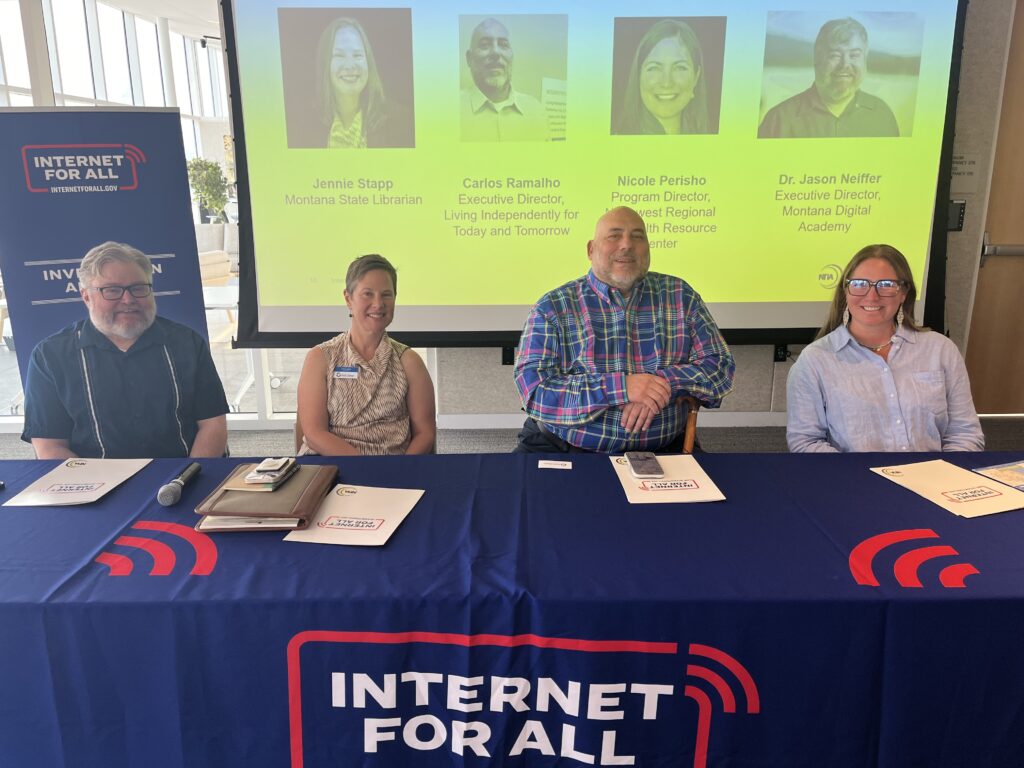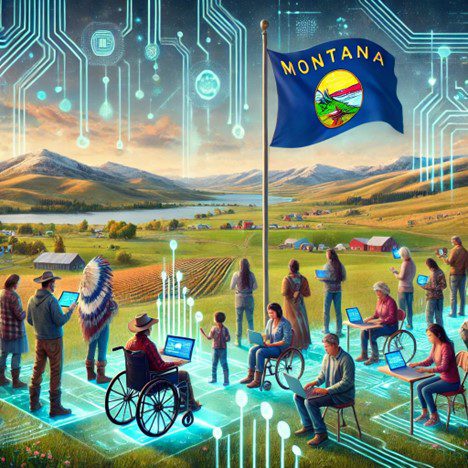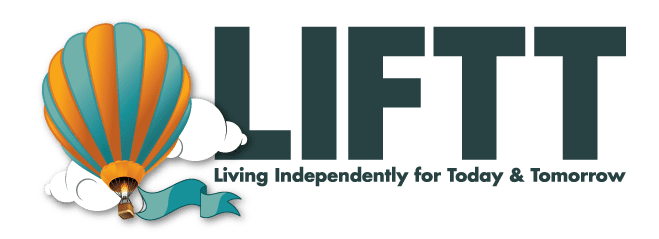
On September 10, LIFTT Executive Director Carlos Ramalho (third from left) traveled to Missoula and participated in a panel discussion on digital equity entitled “Creating Digital Opportunities in Montana,” sponsored by the National Telecommunications & Information Administration. The other panelists included (from left) Dr. Jason Neiffer, Executive Director of the Montana Digital Academy, Jennie Stapp, Montana State Librarian, and Nicole Perisho, Program Director for the Northwest Telehealth Resource Center.
Bridging the Digital Divide
In today’s interconnected world, access to the internet is no longer a luxury but a necessity. However, many individuals, especially those living in rural areas, low-income households, or with disabilities, remain disconnected. This lack of access creates a significant barrier to education, healthcare, employment, and overall participation in society — a divide known as the digital divide. To address this divide, Congress passed the Digital Equity Act, and the President signed it into law. This legislation aims to promote digital inclusion by expanding broadband access, funding digital literacy programs, and ensuring that marginalized communities are not left behind in the digital age.
For Living Independently for Today and Tomorrow (LIFTT), digital equity is not a new priority. Long before the Digital Equity Act was signed into law, LIFTT had already been working to bridge the digital divide in its service area, which spans 18 counties in South Central and Southeastern Montana: Big Horn, Carbon, Carter, Custer, Dawson, Fallon, Garfield, Golden Valley, McCone, Musselshell, Powder River, Prairie, Richland, Rosebud, Stillwater, Treasure, Wibaux, and Yellowstone. As a nonprofit dedicated to promoting independence for individuals with disabilities, LIFTT understood that access to technology was crucial for the people they serve, especially those in rural and underserved areas.
Pioneering Digital Inclusion During the Pandemic
LIFTT’s commitment to digital inclusion became especially critical during the COVID-19 pandemic. As public health restrictions limited in-person services and support, LIFTT recognized the urgent need to connect with its service population digitally. LIFTT developed and launched a state-of-the-art ADA-accessible website and mobile app using private grant funding. This digital platform enabled LIFTT to provide resources, support, and community engagement opportunities remotely, ensuring that people with disabilities could access vital services even when physical interactions were limited.
LIFTT’s website and app served as a lifeline during the pandemic, particularly for consumers of its Independent Living, Personal Care Attendant (PCA), and Community Health Worker (CHW) programs. These digital tools also became essential for LIFTT’s broader mission of empowering people with disabilities to live independently, allowing individuals to access information and communicate with staff without barriers.
Yet, despite these advancements, LIFTT faced significant challenges in fully connecting its rural communities. Many residents in Montana’s vast, sparsely populated regions still lacked reliable broadband access, making it difficult for them to take full advantage of LIFTT’s digital platform. Additionally, digital literacy — the ability to use technology effectively — was a major hurdle for many people LIFTT serves. Seniors and individuals with disabilities often need training to navigate online platforms, use telehealth services, or participate in virtual community meetings.
Leveraging the Digital Equity Act for Future Impact
With the passage of the Digital Equity Act, LIFTT is poised to take its digital inclusion efforts to the next level. The Act provides funding for states to develop and implement comprehensive digital equity plans, focusing on expanding broadband access and promoting digital literacy. For LIFTT, this means that federal resources will be available to address the barriers that have long hindered digital access in Montana.
One key area where LIFTT plans to leverage the Digital Equity Act is expanding its digital literacy programs. By teaching individuals how to use technology for everyday needs — such as accessing telehealth services, applying for jobs, or staying in touch with family — LIFTT will empower more people to take full advantage of the digital world. This is particularly important for the rural and disabled populations LIFTT serves, many of whom are still unfamiliar with essential digital tools and services.
LIFTT also envisions becoming a community hub for digital connection. By creating a space where individuals can access computers, tablets, and high-speed internet — similar to an internet café — LIFTT can provide a physical location for those without internet access to get online. Additionally, the Digital Equity Act offers grant opportunities that LIFTT can use to distribute devices like tablets, laptops, and smartphones to those in need, further ensuring that people in its service area have the tools to connect.
Finally, LIFTT aims to help cover the cost of broadband for low-income residents through grants provided by the Digital Equity Act. By making broadband affordable, LIFTT can help eliminate one of the most significant barriers to digital inclusion, ensuring that more people in South Central and Eastern Montana can participate fully in the digital age.
A Pioneer in Digital Inclusion
LIFTT has been a pioneer in promoting digital inclusion long before the Digital Equity Act was enacted. Its innovative use of technology during the COVID-19 pandemic laid the groundwork for a more connected and inclusive future. With the support of the Digital Equity Act, LIFTT is prepared to expand its efforts, ensuring that the people of Montana — especially those who are most vulnerable — have the digital access and skills they need to thrive.
Cheers to the Digital Equity Act and a place for everyone in the digital future under the Big Sky!
Carlos Ramalho, LIFTT Executive Director
September 2024

About Living Independently for Today & Tomorrow (LIFTT): LIFTT is a Montana 501(c)3 corporation organized as a Center for Independent Living (CIL). With team members based in Billings and Glendive, LIFTT provides people with disabilities with programs and services that help empower them to break down the physical, bureaucratic, and cultural barriers that prevent them from being fully independent participants in their lives and communities throughout 18 counties in southeastern and south-central Montana: Big Horn, Carbon, Carter, Custer, Dawson, Fallon, Garfield, Golden Valley, McCone, Musselshell, Powder River, Prairie, Richland, Rosebud, Stillwater, Treasure, Wibaux, and Yellowstone. For more information, please visit liftt.org or download our mobile app for your Apple or Android Device.
